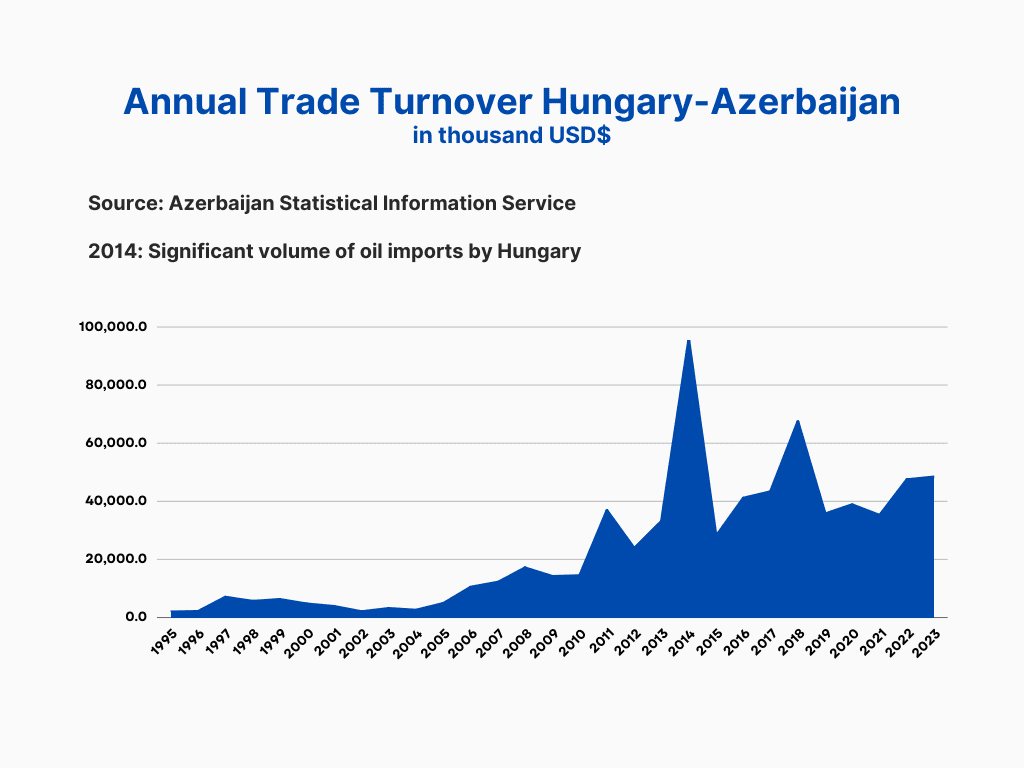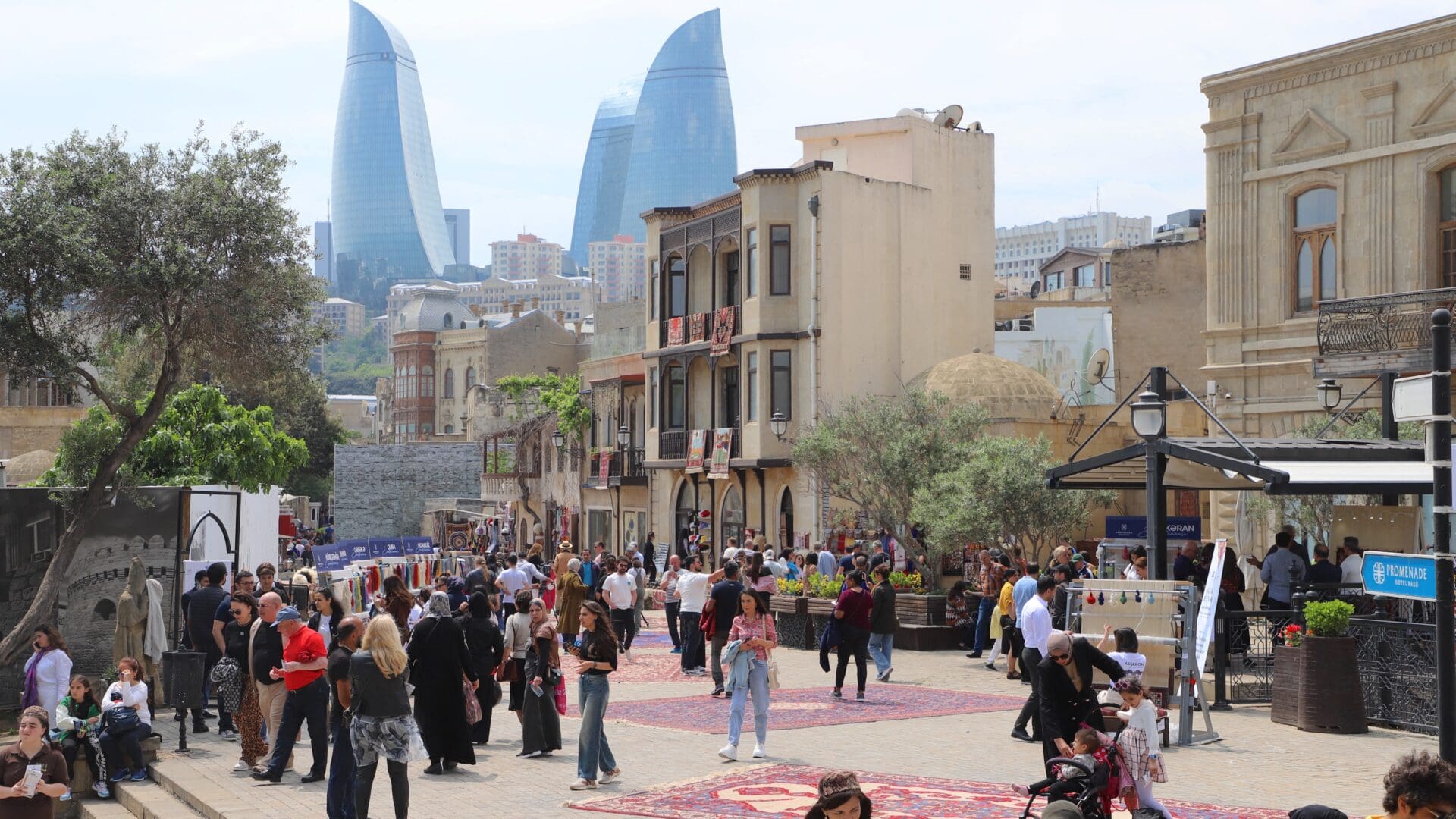Azerbaijan and Hungary have demonstrated a strong commitment to developing their strategic bilateral relations. Azerbaijan has become a new reliable source of energy resources for Hungary, amid the growing interest of Hungarian companies in Azerbaijan’s market and Hungary’s contributions to the rebuilding efforts in the liberated Karabakh region of Azerbaijan.
On 25 April 2024 Hungarian Minister of Foreign Affairs and Trade Péter Szijjártó arrived in Baku to attend the 10th session of the Joint Commission on Economic Cooperation between the governments of Azerbaijan and Hungary. This event was followed by a meeting between the Hungarian Foreign Minister and Azerbaijan’s Minister of Labour and Social Protection of the Population, Sahil Babayev. Additionally, an Azerbaijani-Hungarian business forum was organized, resulting from the cooperation between the Azerbaijani Export and Investment Promotion Agency (AZPROMO) and the Hungarian Export Promotion Agency (HEPA).
Azerbaijan has joined the group of countries exporting natural gas to Hungary, effectively providing Hungary with a new route for diversifying its natural gas imports. The volume of the deliveries in the first phase is expected to reach 55 million cubic metres (mcm), a number that is anticipated to increase significantly, as mentioned by Péter Szijjártó following the business forum. Previously, Hungary had secured a deal with Azerbaijan to deliver 100 mcm of natural gas in the last quarter of 2023 and to store 50 mcm. The natural gas from Azerbaijan is delivered to the Hungarian market both as LNG and through newly constructed pipeline systems, including the Trans-Anatolian Pipeline (TANAP), the Trans-Adriatic Pipeline (TAP), and a number of interconnector pipelines in the Balkans. The Serbia-Hungary Gas Interconnector is responsible for the final leg of gas delivery to Hungary.
Cooperation in the energy sector is expected to expand to include the export of renewable energy from Azerbaijan to Hungary,
following a joint commitment by Azerbaijan, Georgia, Romania, and Hungary. This commitment envisions the construction of the world’s longest undersea high-voltage power line, which will deliver renewable energy from Azerbaijan and potentially include Central Asian countries. These countries are situated in a region abundant with solar energy.
It is important to note that Hungarian-Azerbaijani relations extend beyond the delivery of energy from Azerbaijan to Hungary. Following a meeting with his Azerbaijani counterpart, Jeyhun Bayramov, in Budapest, the Hungarian Foreign Minister remarked: ‘We are not friends only because it turned out that you have natural gas.’ He pointed to the trade turnover between the two countries, which steadily increased prior to natural gas deliveries. Furthermore, it was noted that the active involvement of Hungarian companies in Azerbaijan has become one of the contributing factors to economic growth in Hungary. This was facilitated by the creation of a favourable environment following the signing of the Joint Declaration on Enhanced Strategic Partnership between the Republic of Azerbaijan and Hungary in January 2023, by the President of Azerbaijan, Ilham Aliyev, and the Prime Minister of Hungary, Viktor Orbán.
The visit of Péter Szijjártó to attend the 10th session of the Joint Commission on Economic Cooperation has further highlighted the dynamic development of bilateral trade and opened additional opportunities for deeper involvement of Hungarian companies in Azerbaijan.

Based on the data provided by the Azerbaijan Statistical Information Service (ASIS), one can observe a gradual increase in trade turnover between the countries, with a notable exception in 2014. That year, Hungary imported a significant volume of oil from Azerbaijan amidst falling oil prices and the annexation of Crimea. This situation has further solidified trust between the two countries due to strong cooperation during the crisis. Hungary has also been actively contributing to the mine clearance and rebuilding efforts in Azerbaijan’s liberated Karabakh region. Recognizing its support for peace in the region, the Hungarian Foreign Minister has welcomed the initiation of border demarcation and the peace process between Armenia and Azerbaijan. Additionally, he mentioned Hungary’s contribution of 10 thousand euros towards mine clearance efforts and its participation in the rebuilding of Soltanli village in Karabakh.
The trade turnover is expected to rise significantly following the agreements reached during the business forum in April 2024. During the meeting of the commission, Azerbaijan’s Minister of Labor and Social Protection mentioned the increase in trade turnover by 40.49 per cent compared to the same period in earlier year, in January-February 2024. A key factor contributing to the increase in bilateral trade is the successful operation of Hungarian companies in Azerbaijan. Notably, Hungary’s energy giants MVM and MOL have a presence in Azerbaijan. MVM contributes to the delivery of natural gas to Hungary, while MOL is involved in modernizing extraction technologies and the chemical sector. Additionally, given the significant value of medical products imported by Azerbaijan from Hungary, the pharmaceutical company Richter has signed agreements for the contract manufacturing of ninety drugs in Azerbaijan during the business forum. Furthermore, the Hell energy drink company is also planning to open a factory in Azerbaijan, given the popularity of its products in the country. The event was attended by 55 companies, specializing in sectors such as water, agriculture, ICT, healthcare, automotive, pharmaceuticals, construction, finance, and others. The Hungarian representatives highlighted the initiation of the Asian investment fund and the launch of a 50 million euro credit line by Eximbank, which can be increased threefold if necessary to promote the development of Hungarian businesses in Azerbaijan.
Azerbaijan has the potential to become one of the major natural gas suppliers to Hungary if the current determination to increase import volumes continues.
However, the bilateral relations between the two countries extend beyond natural gas exports and are characterized by an enhanced strategic partnership. Given the commitment to construct an undersea high-voltage power line through the Black Sea, Azerbaijan could also become a key exporter of renewable energy to Hungary. On 1 May 2024 Azerbaijan, Kazakhstan, and Uzbekistan, ahead of the Tashkent International Investment Forum, reached an agreement to construct a similar high-voltage undersea power line through the Caspian Sea. This connection could provide a strong route for exporting renewable energy from Central Asia and Azerbaijan to Hungary and the EU. Additionally, the agreements reached during the 10th session of the Joint Commission on Economic Cooperation and the subsequent business forum will further create encouraging conditions for the development of Hungarian businesses in Azerbaijan, thereby boosting bilateral trade. In addition to exporting natural gas, Azerbaijan provides a favourable environment for the growth of Hungarian businesses and acts as a strategic transit country, facilitating access to both the markets of Central Asia and the region’s energy resources.
Related articles:








